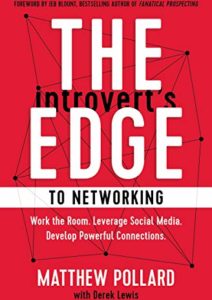The long-held myth of the “born salesperson” is finally crumbling. For years, the world of sales was thought to be the exclusive domain of extroverts—the charismatic, the loud, and always on. But what if the quiet strength of an introvert is actually a superior asset?
That’s the radical and actionable idea at the heart of the conversation between host John Golden and renowned sales strategist Matthew Pollard, author of the bestseller The Introvert’s Edge. Pollard, a once-struggling, shy salesperson who transformed into a top performer, offers a blueprint for how introverts can move beyond reliance on personality and leverage their innate strengths for rapid, lasting growth.
This article distills the core strategies from that conversation, providing a complete guide for introverted salespeople—and their leaders—to redefine success through systems, storytelling, and strategic practice.
Why Introverts Are Perfectly Built for Sales
The first step in leveraging your introversion is understanding what it actually is (and isn’t). Pollard clarifies that introversion isn’t about shyness or social anxiety; it’s simply about where you draw your energy. Introverts recharge alone, while extroverts gain energy from others. Neither is a flaw—they are merely different energy sources.
In sales, this distinction translates into powerful advantages:
- Superior Preparation: Introverts’ methodical nature drives them to invest heavily in research and planning before engaging with prospects, leading to far more targeted and effective conversations.
- Deep Listening: Unlike extroverts who might dominate a discussion, introverts naturally excel at active listening. This allows them to truly understand a client’s specific needs, build authentic rapport, and tailor solutions with precision.
- System Adherence: Introverts thrive with structure. They are naturally more likely to follow proven, repeatable sales processes, leading to the holy grail of sales: consistent, predictable outcomes.
Strategy 1: Ditch Charisma, Embrace the System
Pollard’s personal turning point came when he stopped trying to be charismatic and started relying on a structured sales system. For introverts, a robust system acts as a confidence roadmap, reducing anxiety and replacing unpredictable improvisation with a transparent, step-by-step methodology.
Actionable Steps for System Success:
- Adopt a Framework: Commit to a proven sales methodology (like SPIN, Challenger, or any structured framework) and follow it religiously.
- Document and Review: Write down every stage of your process, from prospecting to closing. Regular review turns your process into a conscious, refineable skill.
- Prioritize Deliberate Practice: As Abraham Lincoln once said, “Give me six hours to chop down a tree and I will spend the first four sharpening the axe.” Don’t just make more calls; make better calls. Dedicate time—even 30 minutes a week—to focused, deliberate practice of key steps in your process. This small investment yields rapid skill improvement.
Strategy 2: Master the Art of Authentic Storytelling
In the absence of high-energy banter, introverts can use storytelling as their secret weapon. Stories are inherently sticky: they activate the brain’s reticular activating system, making your message memorable and emotionally resonant.
Stories cut through the noise of technical jargon and small talk to build immediate trust and relatability. People buy based on emotion, and then justify it with logic—stories provide that critical emotional connection.
How to Build a Compelling Sales Story:
- Start Simple: Don’t try to create a dozen stories. Begin with a single, powerful and compelling story that effectively illustrates your value proposition.
- Focus on the Journey: Move Beyond Features and Benefits. Highlight the client’s challenge, the turning point (where you intervened), and the transformation (the emotional and practical outcome).
- Keep it Conversational: Imagine telling your story over a casual cup of coffee. Ditch the corporate jargon and make it relatable. A powerful example from the podcast involved a gym salesperson whose story wasn’t about weight loss stats, but about helping a client overcome infertility to achieve her dream of starting a family.
For organizations, this means institutionalizing storytelling—creating a “story playbook” with one key narrative per product or niche and training the entire team to tell them until they become second nature.
Strategy 3: Invest Your Time, Not Just Your Money
Pollard and Golden both stress that the most significant barrier to growth isn’t a lack of financial resources for training, but a lack of time investment. Many salespeople invest in professional development but often fail to allocate sufficient time to implement the knowledge they acquire.
The Path to Continuous Improvement:
- Schedule Learning: Block out time weekly for focused skill development, practice, or reading. Don’t let urgent, but less critical, emails crowd out your time for growth.
- Find Your “Why”: Pollard’s initial motivation was intensely personal—he didn’t want to disappoint his family. Discover your core motivation, your deep-seated “why,” and keep it at the forefront. This purpose is the fuel that will sustain your resilience and commitment to continuous learning.
Success in sales isn’t about being the loudest voice in the room; it’s about being the most prepared, strategic, and empathetic. Introverts, by embracing systems, mastering storytelling, and committing to deliberate practice, are uniquely positioned to win.
Ready to unlock your introvert’s edge? Start today—one system, one story, one focused practice session at a time.
Our Host
John is the Amazon bestselling author of Winning the Battle for Sales: Lessons on Closing Every Deal from the World’s Greatest Military Victories and Social Upheaval: How to Win at Social Selling. A globally acknowledged Sales & Marketing thought leader, speaker, and strategist, he has conducted over 1500 video interviews of thought leaders for Sales POP! online sales magazine & YouTube Channel and for audio podcast channels where Sales POP! is rated in the top 2% of most popular shows out of 3,320,580 podcasts globally, ranked by Listen Score. He is CSMO at Pipeliner CRM. In his spare time, John is an avid Martial Artist.










Comments